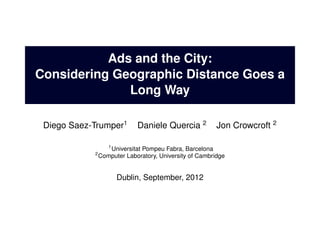Ads and the City
- 1. Ads and the City: Considering Geographic Distance Goes a Long Way Diego Saez-Trumper1 Daniele Quercia 2 Jon Crowcroft 2 1 Universitat Pompeu Fabra, Barcelona 2 Computer Laboratory, University of Cambridge Dublin, September, 2012
- 3. Category #Venues #Users food 1,293 1,566 nightlife 1,075 1,207 travel 850 1,744 home/work/etc. 411 1,037 shops 362 878 arts&entertainment 348 841 parks&outdoors 184 363 education 49 117 Total 4,572 3,110 Table: London Foursquare Data
- 4. Given a venue, suggests guests
- 5. Context similar to target advertising (?) domain knowledge in people mobility
- 6. On people mobility (from the literature) distance matters likes might matter Ī░power usersĪ▒ are special p(go|like, close) Īž pgo Īż pclose Īż plike
- 7. plike #venues visited by user u with rating lui p(like = lui |go) = total #venues visited by user u lui is ranking obtained from item-based CF algorithm.
- 8. pgo #venues visited by user u pgo = total #venues
- 9. pclose 1 pclose = k1 ”┴ dui
- 10. pclose 1 pclose = k1 ”┴ dui
- 11. pclose 1 pclose = k1 ”┴ dui Category ”┴ food 1.64 nightlife 1.61 travel (airports/trainstations) 2.22 home/work/etc. 1.62 shops 1.64 arts&entertainment 1.64 parks&outdoors 1.68 education 1.93 High ”┴ Ī· travel farther
- 12. p(go|like, close) Īž pgo Īż pclose Īż plike Naive Bayesian Bayesian Linear Regression
- 13. Results
- 14. Results
- 15. Results
- 16. Results 1.0 p_go p_close p_like 0.8 Naive Bayesian Linear Reg. 0.6 accuracy 0.4 0.2 0.0 Arts.and.Ent. Education Food HomeWork Nightlife Parks Shops Travel
- 18. When it does not work
- 19. When It Does not Work
- 20. When It Does not Work
- 21. Final Remarks results depend on venue category (different ”┴ and predictability) geographic closeness plays a very important role. domain knowledge signi?cantly improves recommendations results.
- 22. Ī░Understanding the speci?cs of your domain is critical to building a good recommenderĪ▒ Paul Lamere @ recsysĪ»12
- 23. Questions?























